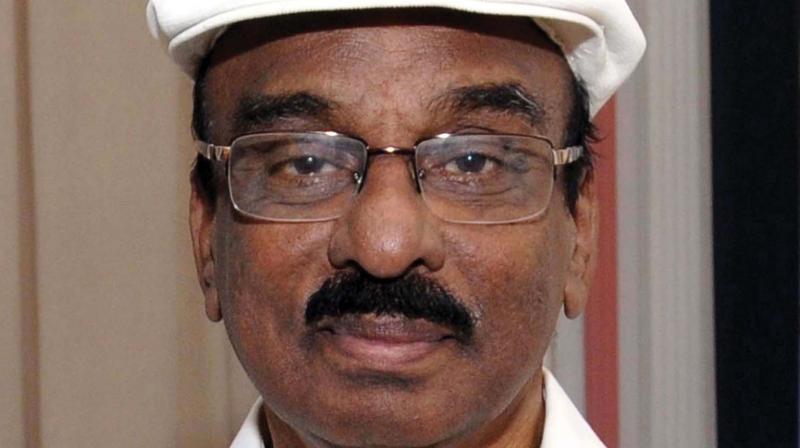Veteran filmmaker I V Sasi passes away
Unlike his celebrated peers, Sasi emerged as the state's greatest ever crowd pleaser.;

Thiruvananthapuram: Prolific filmmaker I V Sasi who, along with K G George, Padmarajan and Bharathan, moved Malayalam cinema firmly away from the stuffy studio-made formulaic films of the 70s and 80s, died in Chennai on Tuesday. He was 69. The filmmaker, who was suffering from a spate of illnesses, died on way to hospital from his residence in Saligramam in Chennai. Sasi leaves behind wife and actor Seema and two children Anu and Ani. Sasi experimented with a bewildering variety of genres in his 150-odd films – from revenge sagas and forbidden liaisons to political satires and period dramas – but made them all accessible to the common man. Unlike his celebrated peers, Sasi emerged as the state’s greatest ever crowd-pleaser. His associations with M T Vasudevan Nair, Padmarajan and T Damodaran produced all-time classics.
The name not only brought in crowds but Sasi also had the rare ability to mesmerize a multitude to do his bidding in front of the camera. Modern filmmakers resort to technology but it still remains a mystery as to how Sasi managed to make a crowd emote for him. “It is similar to taming an elephant that had turned violent with a mere glance,” said filmmaker M Padmakumar, who had assisted Sasi in 18 films.
Sasi was perhaps one of the few filmmakers in the country who understood the aesthetics of anarchy. “He would be keenly aware of the performance of a person in the crowd as he would be about his main actors like Mammootty or Mohanlal,” said Ramachandra Babu, his cinematographer for at least 10 films. Some of his political blockbusters like ‘Eenadu’, ‘Iniyenkulum’, ‘Vartha’ and ‘Adimakal Udamakal’ reflect the frightening chaos of a messy revolution and yet holds together as a coherent whole. ‘Eenadu’ (1982) packs umpteen weighty issues within its two-and-a-half hour duration – college violence, spurious liquor, souring Gulf dreams, political corruption, waning political idealism - and yet emerges creatively unscathed.
He was also a peculiar kind of alchemist who had the crowd cheering for him even when he performed the emotionally and politically tricky act of striking at the roots of orthodoxy. ‘Aroodam’ (1982) and ‘Avalude Raavukal’ (1978) mocked at taboos and still won awards and hearts. Sasi won the Nargis Dutt Award for the best feature film on national integration in 1982 for Aarodaam. He shared the national award with the film's producer. Sasi did art direction in 45-odd South Indian films before graduating into independent director with ‘Ulsavam’ in 1975, in which he cast against the grain; leading villain K P Ummer was his choice of hero. ‘Ulsavam’, however, was only his second film.
Earlier, on buddy Kamal Hassan's recommendation, Telugu actress Vijay Nirmala asked him to direct a film. She gave him the film on the condition that their credits will be swapped. She will get credit as director, he the producer. The film was ‘Kaatu Vithachu’, a big hit then. A native of Kozhikode, Sasi was a diploma holder from Madras School of Arts. Some of his well-known blockbusters include "Alkoottathil Thaniye", "Kanamarayathu", "Aksharangal", "Vadakaykkoru Hrudayam", "Itha Ivide Vare", "Angadi", "Ee Nadu", "Vartha", "Devasuram" and "Avanazhi". In 2015, Kerala government presented him with the J C Daniel Award, the highest film honour in the state.

